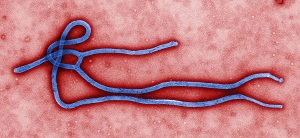 |
| Ebolavirus under an electron microscope--Courtesy of CDC |
Johnson & Johnson ($JNJ) is ready to start trialing its Ebola vaccine in Africa, where Merck ($MRK) and NewLink ($NLNK) are preparing to take theirs into Phase III. GlaxoSmithKline ($GSK) is also testing its jab there.
But while thousands of healthcare workers have volunteered to participate in Ebola vaccine trials, the decision to mass-vaccinate against the disease is still up in the air.
J&J will begin trials of its "prime-boost" candidate in Ghana, Tanzania and Kenya soon, Sky News reports. The vaccine--the third to be tested in humans--is currently in trials in the U.K. Merck and NewLink will move into final-phase testing of their candidate on March 7 in Guinea, said the World Health Organization (WHO), as quoted by Reuters.
But an independent advisory body won't decide whether to recommend widespread introduction of Ebola vaccines until August at the earliest, the WHO said on Friday.
Mass vaccination is "by no means a given," WHO spokesman Christian Lindmeier said at a news briefing, according to Reuters. He stressed that widespread introduction of a vaccine will depend on recommendations from the WHO's Strategy Advisory Group of Experts (SAGE) as well as trial results.
"Decisions on whether or not to introduce the vaccine will be made by the respective ministries of health of countries," Lindmeier said.
The number of Ebola cases has been falling recently, with a steep drop in Liberia. If the outbreak keeps waning, there may not be enough people on whom to test the experimental vaccines.
"We know the vaccines are safe, we know they produce a good immunogenic response in humans, but we don't know if they are effective when you actually have disease in community," WHO spokeswoman Margaret Harris told Reuters.
 |
| Matthew Snape |
Matthew Snape, who is leading J&J's U.K. trial, remains optimistic. According to Sky News, he said that having multiple companies developing vaccines is "useful for the future."
"If there were to be another large Ebola outbreak or a mass immunisation campaign planned for Ebola the more manufacturers you have the better," Snape said. "They may be making different vaccines and there may be different vaccines used in different situations."
- read the Reuters story
- get more from Sky News
- read the Merck news from Reuters
Special Reports: 10 drugs that could stop Ebola